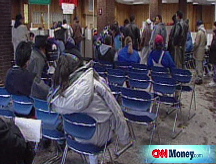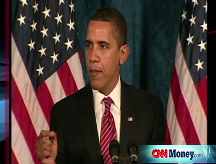Stimulus: What's next
Here's how the Senate bill differs from the House version -- and a preview of where the debate could heat up.
NEW YORK (CNNMoney.com) -- In the coming days, a compromise version of the economic recovery plan is likely to pass the Senate with a handful of Republican votes.
But a final bill is still a ways off.
If the Senate passes the bill, leaders will need to then negotiate the final bill with the House, which passed a different version nearly two weeks ago.
Senate Democrats can't pass a stimulus package without at least a few Republicans signing on - unlike, the House Democrats, who passed their version without a single Republican vote. That means the Senate bill will dominate the House-Senate negotiations.
The aim of the plan's proponents: Final votes in both chambers before Congress begins its Presidents Day recess on Friday.
The House and Senate bills are identical in many ways. But there are some key differences in the area of tax breaks, spending measures and direct benefits to people hurt by the recession. Those differences offer a preview of the issues that could arise this week.
Make Work Pay Credit: The Senate bill would narrow President Obama's signature tax provision. The full credit ($500 per worker or $1,000 per couple filing jointly) would be paid to people making $70,000 or less ($140,000 per couple). Under the House bill, those making $75,000 or less ($150,000 or less for couples) would qualify.
Break for higher income families: The Senate version includes a one-year provision to protect middle- and upper-middle-income families from having to pay the Alternative Minimum tax. The AMT was intended primarily for high-income taxpayers but has in recent years threatened to engulf those lower down the income scale. The House bill has no such provision.
Credit for car buyers: The Senate voted for an amendment that would let those who buy a car in 2009 deduct the interest they pay on their car loan as well as the sales tax charged in the purchase. The House bill doesn't include this provision.
Home-buyer credit: The Senate bill would double the size of an existing temporary home-buyer credit to $15,000. It would also allow all homebuyers to claim it and remove the requirement under current law that the credit be paid back. The House bill also removes the repayment requirement but leaves the credit maximum at $7,500 and would offer it only to first-time buyers.
Child-care credit: Both the Senate and House would expand the eligibility provisions of the child-care tax credit, so that lower income families could claim more of it. But the Senate expansion is smaller.
Education funding: The compromise Senate bill allocates $39 billion to a fiscal stabilization fund that states would use in great part to help fund public colleges and universities. That is well below the $79 billion allocated by the House.
The Senate version also provides less funding for Head Start and teacher quality programs, as well as education efforts for the disadvantaged. It would also eliminate funding in the House bill for K-12 construction and higher education facilities.
Health wellness and flu prevention: The Senate bill excludes money allocated by the House for a prevention and wellness program as well as for pandemic flu research.
Green government vehicles: The Senate version offers $300 million to purchase fuel-efficient government vehicles. That's half the amount allocated by the House bill.
Subsidy for health insurance for those laid off: Both the Senate and House bills include provisions to help jobless workers pay for health insurance if they choose to stay on their ex-employer's plan. The Senate, however, offers less of a subsidy - 50% for 12 months - than the House, which calls for a 65% subsidy over 12 months.
Tax break on unemployment benefits: The Senate bill, unlike the House version, would make the first $2,400 of unemployment benefits tax free. Both the Senate and House bills extend the time that jobless workers can collect benefits.
The Senate's bipartisan compromise aimed to reduce the package's overall price tag and remove elements that critics argued did not belong in a stimulus bill.
The House-passed version was estimated to increase the deficit by $820 billion over 10 years. The version initially considered by the Senate cost $885 billion, but grew to more than $900 billion after amendments were passed last week.
Now lawmakers and others estimate that the cost of the revised package, including the bipartisan compromise, is between $820 billion and $827 billion, the same or higher than the House package.
But those are unofficial estimates. The final word on the official taxpayer cost of the Senate bill belongs to the Congressional Budget Office and the congressional Joint Committee on Taxation. Their evaluations will likely be released early this week.
Talkback: Is the economy giving you wedding jitters? Are you cutting back on your big-day plans or are you still going all out? Email realstories@cnnmoney.com and you could be included in an upcoming article. ![]()



